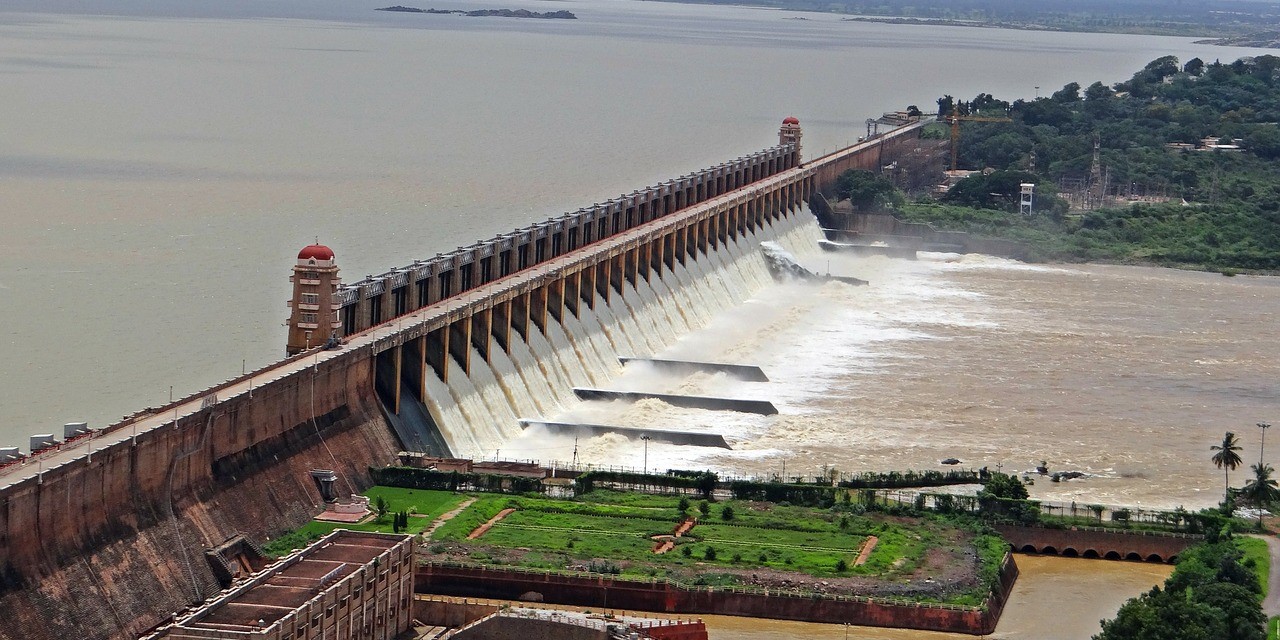The YSRCP is also preparing to mount pressure on the Centre by raising the issue in the ongoing Budget Session of Parliament.

A dam on the Tungabhadra river. (Representational image/Creative Commons)
Andhra Pradesh is gearing up to launch a legal battle against the Upper Bhadra Project (UBP) taken up by neighbouring Karnataka.
The state’s Water Resources Department is preparing to file a Special Leave Petition (SLP) objecting to the project, claiming that it is illegal and also deprives the Rayalaseema region of drinking and irrigation water.
It is also learnt that the YSRCP is preparing to mount pressure on the Centre by raising the issue in the ongoing Budget Session of Parliament.
Though the Karnataka government had taken up the Upper Bhadra project in 2015, the recent allocation of ₹5,300 crore to the project in the Union budget appears to be the trigger for the Andhra Pradesh government to take up the issue in an aggressive mode.
The project, coming up on the River Bhadra in the Chikkamagaluru district of Karnataka, could affect the water flow into river Tungabhadra, which traverses through Rayalaseema, it is feared.
Once the project is complete, Andhra Pradesh is worried that the KC Canal, Rajolibanda Diversion Scheme (RDS), Tungabhadra Dam, Nagarjunasagar, Srisailam, and the Krishna Delta would face serious problems regarding water for both drinking and irrigation.
“Moreover, there is no water allocation for the Upper Bhadra Project. The Karnataka government is constructing the project based on the water allocation done by the Brijesh Kumar Tribunal. But, it should be noted that the Brijesh Kumar Tribunal’s order/proposals are yet to be notified,” Rayalaseema Intellectuals Forum (RIF) convenor M Purushottam Reddy told South First.
Andhra Pradesh has already approached the Supreme Court against the Brijesh Kumar Tribunal’s award, which is being heard by the apex court. This means the water allocation done by the Bachawat Tribunal is still in force.
Reddy also said that the Andhra Pradesh government should put up a spirited fight against the Upper Bhadra Project in the interest of the state, especially Rayalaseema, and stop the project.
He said he was also hopeful that the Andhra Pradesh government would bring pressure on the Centre.
The Upper Bhadra Project is aimed at providing micro-irrigation in drought-prone regions of Chitradurga, Tumakuru, and Davanagere via lift irrigation from the Bhadra river in the Chikkamagaluru district of Karnataka.
The project includes plans of lifting up to 17.40 tmcft of water in the first stage from the Tunga river to the Bhadra river and further lifting 29.9 tmcft of water in the second stage from Bhadra to Ajjampura in the Tungabhadra sub-basin.
The lift irrigation project aims to provide sustainable micro irrigation to 2.25 lakh hectares of farmland, especially in the Kharif season.
Along with the distribution of waters of River Krishna, the Brijesh Kumar Tribunal in 2013 allocated 9 tmcft to Upper Bhadra on the basis of a 65 percent availability.
Subsequently, Andhra Pradesh filed an SLP in the Supreme Court against the notifying of the Brijesh Kumar Tribunal judgment and to redistribute the Krishna waters to the four states.
The Supreme Court also directed the Centre not to notify the Brijesh Kumar Tribunal verdict.
Andhra Pradesh Irrigation Department Chief Engineer C Narayana Reddy told reporters recently that Upper Bhadra was an illegal project undertaken by Karnataka without allocation of water.
As per the orders of Chief Minister YS Jagan Mohan Reddy, Andhra Pradesh would file an SLP in the Supreme Court to stop the project.
Rayalaseema’s Anantapur, Kurnool, and Kadapa districts draw water from the Tungabhadra river via three canals.
Due to the reservoir silting, these canals are not receiving their allotted water.
The constriction of the Upper Bhadra Project in the upper reaches was expected to further reduce the flow into the Tungabhadra, which would result in a further reduction in the availability of water in these canals.
The Krishna Water Disputes Tribunal II (KWDT-II), led by former Supreme Court judge Brijesh Kumar, pronounced its final verdict on 29 November, 2013.
This was the second tribunal that looked into the dispute over sharing of the Krishna river waters among the three riparian states of Maharashtra, Karnataka, and the yet-to-be-bifurcated Andhra Pradesh.
The first tribunal (KWDT-I), led by retired Supreme Court judge RS Bachawat, had given its order in 1973, and it was binding till May 2000.
The Centre appointed the second tribunal in 2004 and it started its work in 2006.
Under the Bachawat Tribunal award, Andhra Pradesh’s share of allocation was 811 thousand million cubic feet (tmcft). One tmcft equals 28.3 billion litres.
The share of Karnataka was 734 tmcft, and that of Maharashtra was 585 tmcft.
The Bhachawat tribunal also granted Andhra Pradesh the liberty to use a surplus of around 337 tmcft of water.
Andhra Pradesh, which is located at the tail end of the river, has a self-catchment of 337 tmcft and the rest is released from the upper riparian states.
However, as per the final award of the Brijesh Kumar Tribunal, the surplus water allocated to Andhra Pradesh by the Bhachawat Tribunal was distributed among all the states.
The Brijesh Kumar Tribunal award allocated 1,005 tmcft to Andhra Pradesh, 907 tmcft to Karnataka, and 666 tmcft to Maharashtra. This award will be binding till 2050.
Due to the Brijesh Kumar Tribunal verdict, Andhra Pradesh lost at least 143 tmcft from the previous allocation, and approached the Supreme Court.

May 18, 2024

May 18, 2024

May 18, 2024

May 18, 2024

May 18, 2024

May 18, 2024